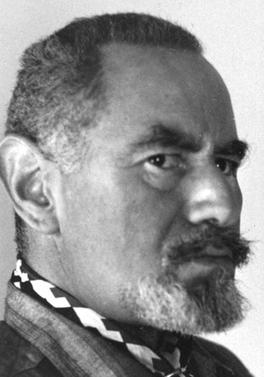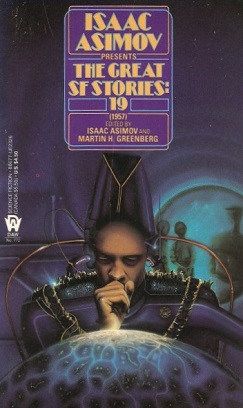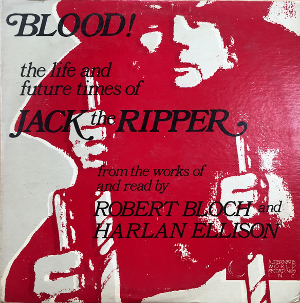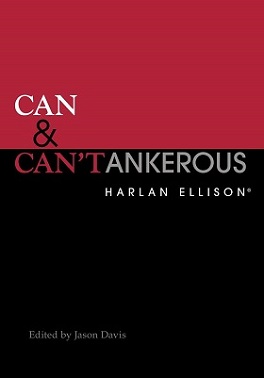Related Research Articles

Harlan Jay Ellison was an American writer, known for his prolific and influential work in New Wave speculative fiction and for his outspoken, combative personality. His published works include more than 1,700 short stories, novellas, screenplays, comic book scripts, teleplays, essays, and a wide range of criticism covering literature, film, television, and print media. Some of his best-known works include the 1967 Star Trek episode "The City on the Edge of Forever", considered by some to be the single greatest episode of the Star Trek franchise, his A Boy and His Dog cycle, and his short stories "I Have No Mouth, and I Must Scream" and "'Repent, Harlequin!' Said the Ticktockman". He was also editor and anthologist for Dangerous Visions (1967) and Again, Dangerous Visions (1972). Ellison won numerous awards, including multiple Hugos, Nebulas, and Edgars.

A Boy and His Dog is a cycle of narratives by author Harlan Ellison. The cycle tells the story of an amoral boy (Vic) and his telepathic dog (Blood), who work together as a team to survive in the post-apocalyptic world after a nuclear war. The original 1969 novella was adapted into the 1975 film A Boy and His Dog directed by L.Q. Jones. Both the story and the film were well-received by critics and science fiction fans, but the film was not successful commercially. The original novella was followed by short stories and a graphic novel. The dog in the movie was first in the 1969 Brady Bunch episodes named Tiger.

"I Have No Mouth, and I Must Scream" is a post-apocalyptic science fiction short story by American writer Harlan Ellison. It was first published in the March 1967 issue of IF: Worlds of Science Fiction.

Lawrence Taylor Shaw was an American Hugo Award-winning science fiction fan, author, editor and literary agent who usually published as Larry T. Shaw.

Gerald Kersh was a British and later also American writer of novels and short stories.
"'Repent, Harlequin!' Said the Ticktockman" is a dystopian science fiction short story by American writer Harlan Ellison that was published in 1965. It is nonlinear in that the narrative begins in the middle, then moves to the beginning, then the end, without the use of flashbacks. Stylistically, the story deliberately ignores many of the conventional "rules of good writing", including a paragraph about jelly beans which is almost entirely one run-on sentence. First appearing in the science fiction magazine Galaxy in December 1965, it won the 1966 Hugo Award, the 1965 Nebula Award and the 2015 Prometheus Hall of Fame Award.
"Jeffty Is Five" is a fantasy short story by American author Harlan Ellison. It was first published in The Magazine of Fantasy & Science Fiction in 1977, then was included in DAW's The 1978 Annual World's Best SF in 1978 and Ellison's short story collection Shatterday two years later. According to Ellison, it was partially inspired by a fragment of conversation that he misheard at a party at the home of actor Walter Koenig: "How is Jeff?" "Jeff is fine. He's always fine," which he perceived as "Jeff is five, he's always five." Ellison based the character of Jeffty on Joshua Andrew Koenig, Walter's son. He declared:
... I had been awed and delighted by Josh Koenig, and I instantly thought of just such a child who was arrested in time at the age of five. Jeffty, in no small measure, is Josh: the sweetness of Josh, the intelligence of Josh, the questioning nature of Josh.
"The Whimper of Whipped Dogs" is a horror short story by Harlan Ellison. It was first published in the 1973 anthology Bad Moon Rising: An Anthology of Political Forebodings edited by Thomas M. Disch. It was also published in several other anthologies such as Deathbird Stories. It was inspired by the murder of Kitty Genovese.
"Demon with a Glass Hand" is an episode of the American television series The Outer Limits, the second to be based on a script by Harlan Ellison, which Ellison wrote specifically with actor Robert Culp in mind for the lead role. It originally aired on October 17, 1964, and was the fifth episode of the second season. In 2009, TV Guide ranked "Demon with a Glass Hand" #73 on its list of the 100 Greatest Episodes.
"Soldier" is the first of two episodes of The Outer Limits television series written by Harlan Ellison and is loosely adapted from his 1957 short story "Soldier from Tomorrow." Ellison later brought suit against the producers and distributor of The Terminator (1984) for plagiarism of this episode.
"A Toy for Juliette" is a 1967 science fiction and horror short story by American writer Robert Bloch, appearing for the first time in Harlan Ellison's anthology Dangerous Visions.

Web of the City is the first novel written by American author Harlan Ellison. The novel follows the story of Rusty Santoro, a teenage member of the fictional Cougars street gang in the 1950s Brooklyn, New York. In order to research the book, Ellison spent time in an actual street gang in Brooklyn. His book Memos from Purgatory (1961) is a non-fiction account of his time in the Barons.
"The Discarded" is a science fiction short story by American writer Harlan Ellison. It was first published in the April 1959 issue of Fantastic and was later included in the 1965 short story collection Paingod and Other Delusions and the third volume of the audiobook collection The Voice From The Edge.

Isaac Asimov Presents The Great SF Stories 19 (1957) is the nineteenth volume of Isaac Asimov Presents The Great SF Stories, which is a series of short story collections, edited by Isaac Asimov and Martin H. Greenberg, which attempts to list the great science fiction stories from the Golden Age of Science Fiction. They date the Golden Age as beginning in 1939 and lasting until 1963. This volume was originally published by DAW books in February 1989.

The Outer Limits is an American television series that was broadcast on ABC from September 16, 1963, to January 16, 1965, at 7:30 PM Eastern Time on Mondays. It is often compared to The Twilight Zone, but with a greater emphasis on science fiction stories. It is an anthology of self-contained episodes, sometimes with plot twists at their ends.
The Voice From the Edge is a series of audiobooks collecting short stories written and narrated by American author Harlan Ellison. The first two volumes were published by Fantastic Audio; they were republished by Blackstone Audio in 2011. The uploading of these audio books to a newsgroup on the internet led to a court case to decide the liability of a service provider according to the Digital Millennium Copyright Act. The fourth volume was published by Audible.

Blood! The Life And Future Times Of Jack The Ripper was a set of two record albums that was issued in 1977. The first record has American writer Robert Bloch reading his short stories, "Yours Truly, Jack the Ripper" and "A Toy for Juliette". The first was published in Weird Tales in 1943; the second appeared in Harlan Ellison's science fiction anthology, Dangerous Visions. On the second record is speculative fiction author Harlan Ellison reading his short story, "The Prowler in the City at the Edge of the World".

Can & Can'tankerous is a 2015 collection of previously uncollected short stories written by Harlan Ellison. The collection includes the story "How Interesting: A Tiny Man", which won the 2011 Nebula Award for Best Short Story alongside "Ponies" by Kij Johnson. The collection was edited by Jason Davis and includes an introduction to the story "Loose Cannon" written by Neil Gaiman.
"How Interesting: A Tiny Man" is a 2010 science fiction/magical realism short story by American writer Harlan Ellison. It was first published in Realms of Fantasy.
This is a list of works by Harlan Ellison (1934–2018). It includes his literary output, screenplays and teleplays, voiceover work, and other fields of endeavor.
References
- ↑ "Harlan Ellison Bibliography: Publication List" . Retrieved 2011-10-01.
- 1 2 Marx, Andy. "IT'S MINE All Very Well and Good, but Don't Hassle the T-1000". Los Angeles Times. Archived from the original on April 30, 2011. Retrieved 2009-08-22.